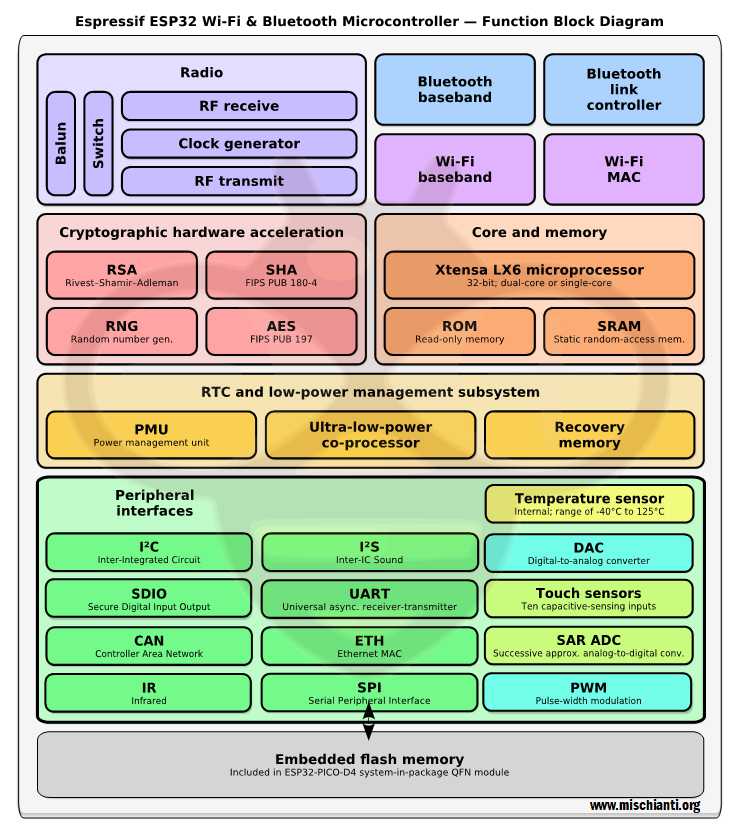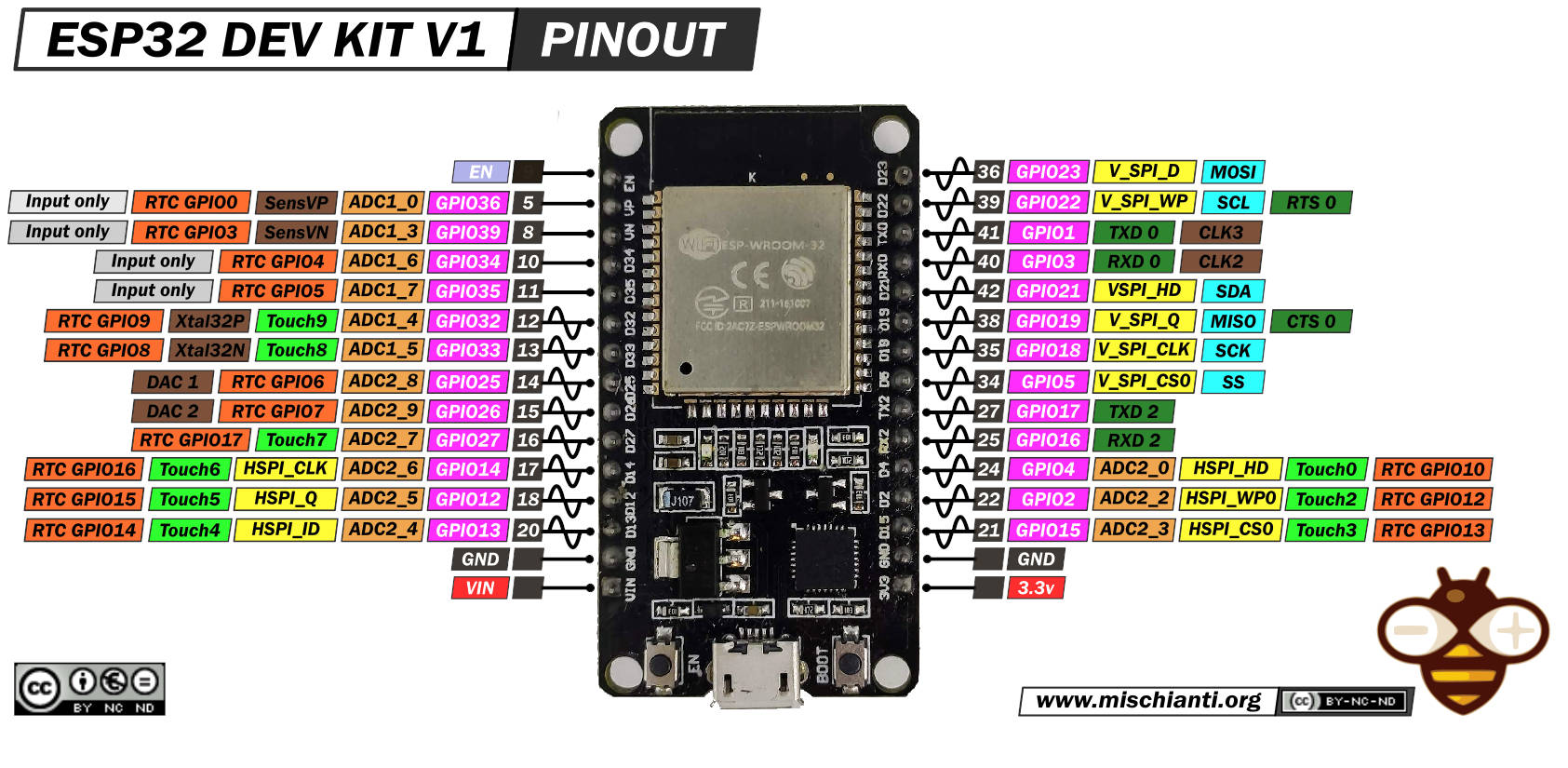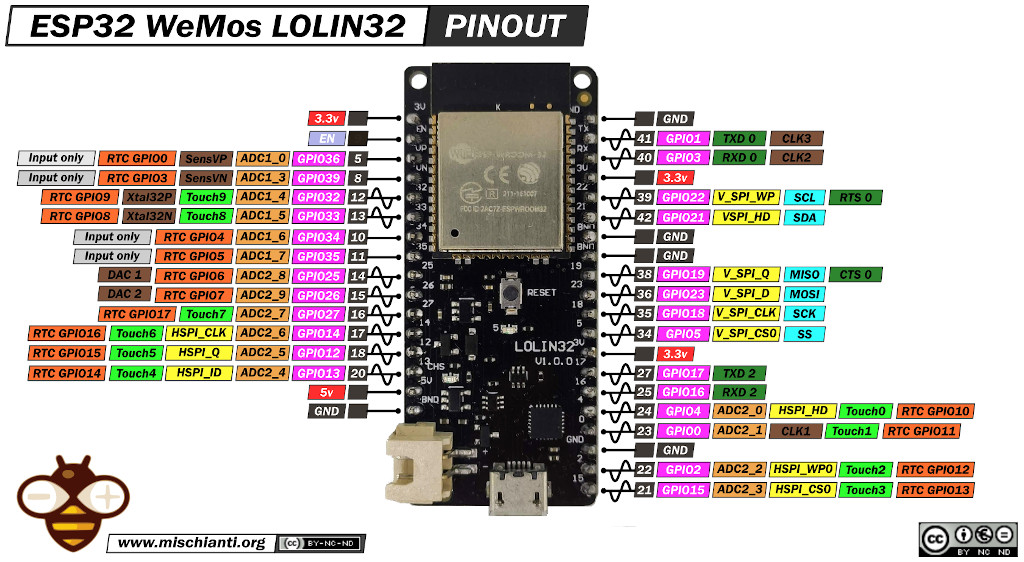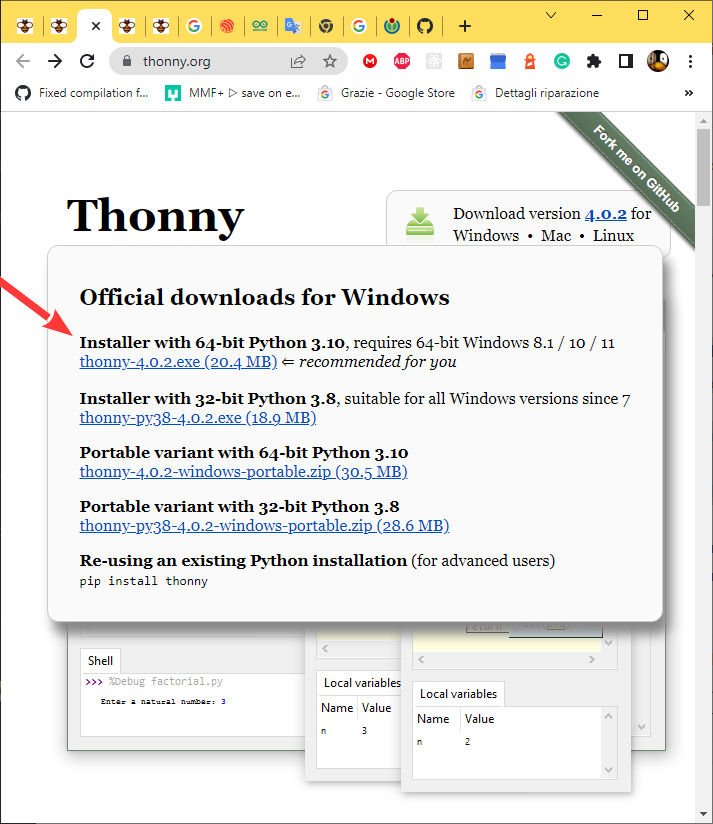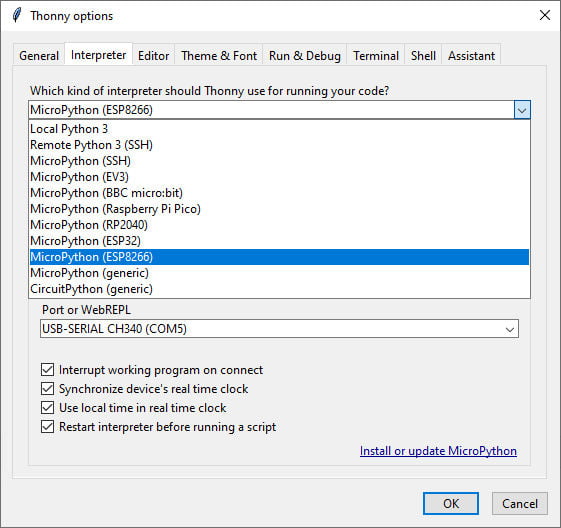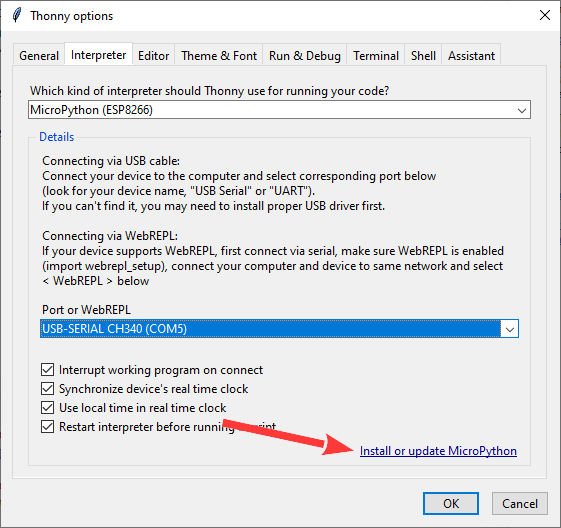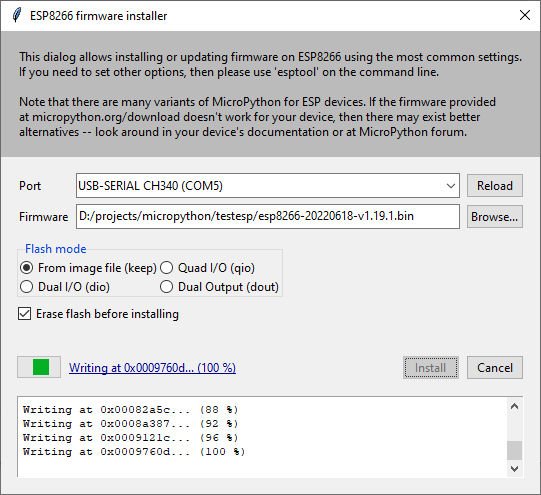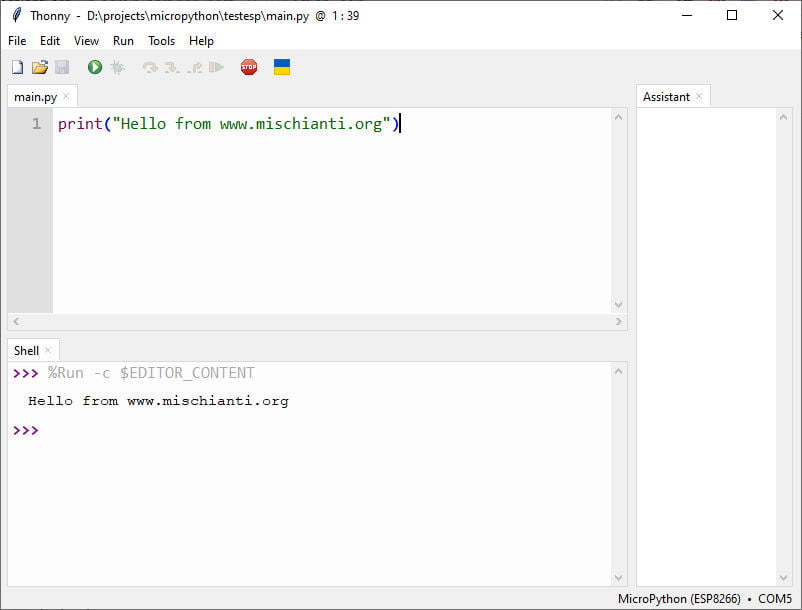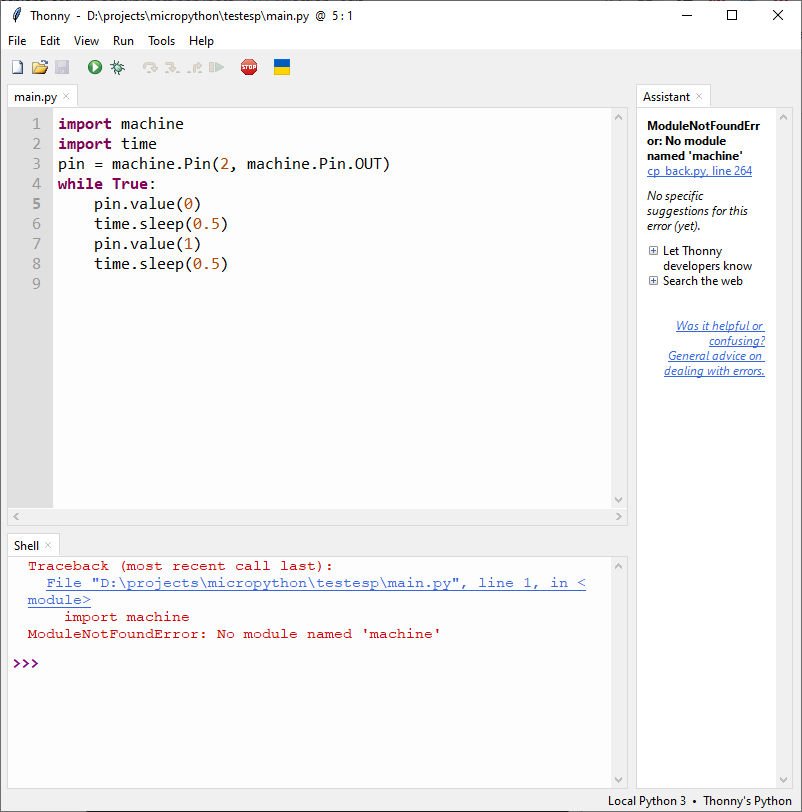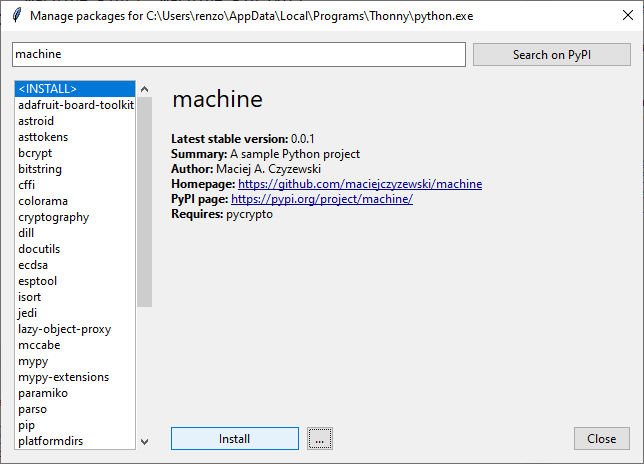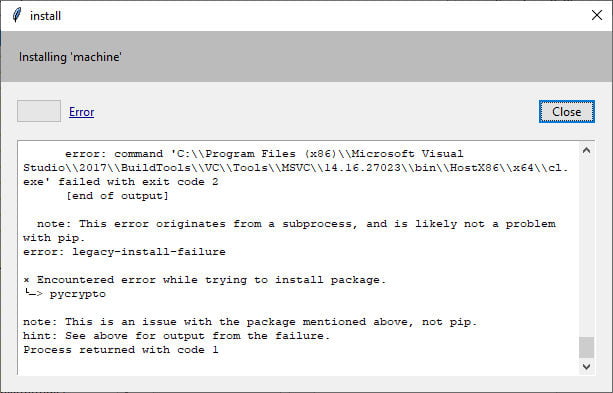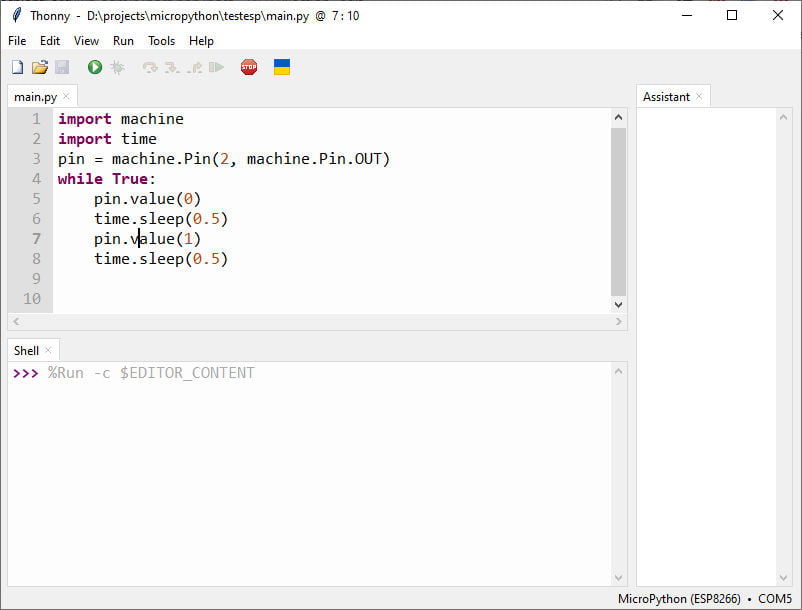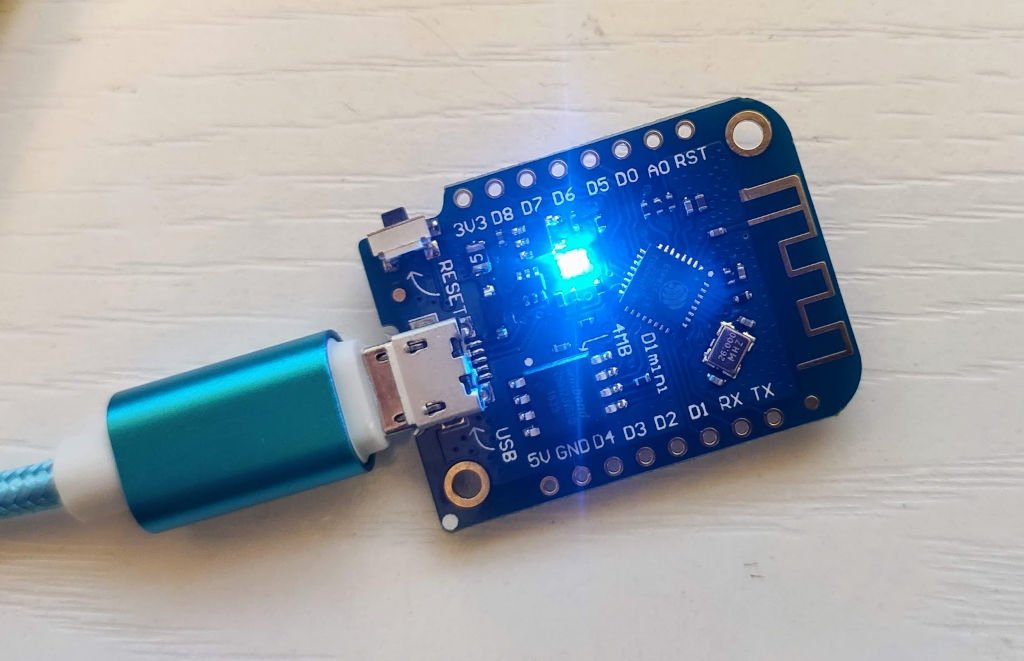MicroPython with esp8266 and esp32: flashing firmware and using Thonny IDE – 2
MicroPython is a lean implementation of the Python programming language that is optimized for use on microcontrollers and embedded systems. It is designed to be lightweight, efficient, and easy to use, and it provides a way to program microcontrollers using Python code.
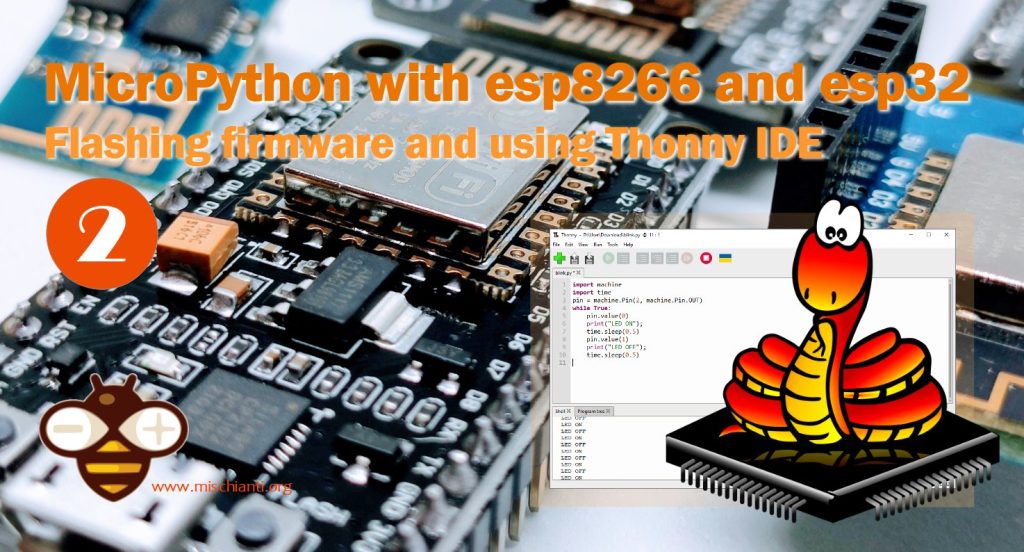
One of the most popular microcontrollers used with MicroPython is the ESP8266 and ESP32, which are low-cost, Wi-Fi enabled microcontrollers that can be used for a wide variety of projects. In this article, we will explore how to get started with MicroPython on the ESP8266 and ESP32 using Thonny, a popular Python IDE.
ESP32 details
I like these devices. It’s very powerful and low cost with an effective value WIFI microcontroller.
You can buy the esp32 from my selection here ESP32 Dev Kit v1 - TTGO T-Display 1.14 ESP32 - NodeMCU V3 V2 ESP8266 Lolin32 - NodeMCU ESP-32S - WeMos Lolin32 - WeMos Lolin32 mini - ESP32-CAM programmer - ESP32-CAM bundle - ESP32-WROOM-32 - ESP32-S
Specs
Remember that exist a lot of variants of this device. Some have a specified killer function, so this is a generic specs description.
- Processors:
- CPU: Xtensa dual-core (or single-core) 32-bit LX6 microprocessor, operating at 160 or 240 MHz and performing at up to 600 DMIPS
- Ultra low power (ULP) co-processor
- Memory: 520 KiB SRAM
- Wireless connectivity:
- Wi-Fi: 802.11 b/g/n
- Bluetooth: v4.2 BR/EDR and BLE (shares the radio with Wi-Fi)
- Peripheral interfaces:
- 12-bit SAR ADC up to 18 channels
- 2 × 8-bit DACs
- 10 × touch sensors (capacitive sensing GPIOs)
- 4 × SPI
- 2 × I²S interfaces
- 2 × I²C interfaces
- 3 × UART
- SD/SDIO/CE-ATA/MMC/eMMC host controller
- SDIO/SPI slave controller
- Ethernet MAC interface with dedicated DMA and IEEE 1588 Precision Time Protocol support
- CAN bus 2.0
- Infrared remote controller (TX/RX, up to 8 channels)
- Motor PWM
- LED PWM (up to 16 channels)
- Hall effect sensor
- Ultra low-power analog pre-amplifier
- Security:
- IEEE 802.11 standard security features all supported, including WFA, WPA/WPA2 and WAPI
- Secure boot
- Flash encryption
- 1024-bit OTP, up to 768-bit for customers
- Cryptographic hardware acceleration: AES, SHA-2, RSA, elliptic curve cryptography (ECC), random number generator (RNG)
- Power management:
- Internal low-dropout regulator
- Individual power domain for RTC
- 5μA deep sleep current
- Wake up from GPIO interrupt, timer, ADC measurements, capacitive touch sensor interrupt
Pinouts
ESP32 DEV KIT v1
ESP32 DevKIT v4
ESP32 WeMos LOLIN32
This device is very powerful, and you can see that there are capacitive touch pins, more than one UART various Analog pins.
How to
You must download drivers for the USB chip, probably you have an esp32 version with cp2102, but exist a variant with ch340 chip.
ESP8266 details
You can find It here WeMos D1 mini - NodeMCU V2 V2.1 V3 - esp01 - esp01 programmer
Specs
- Processor: L106 32-bit RISC microprocessor core based on the Tensilica Xtensa Diamond Standard 106Micro running at 80 MHz[5]
- Memory:
- 32 KiB instruction RAM
- 32 KiB instruction cache RAM
- 80 KiB user-data RAM
- 16 KiB ETS system-data RAM
- External QSPI flash: up to 16 MiB is supported (512 KiB to 4 MiB typically included)
- IEEE 802.11 b/g/n Wi-Fi
- Integrated TR switch, balun, LNA, power amplifier and matching network
- WEP or WPA/WPA2 authentication, or open networks
- 16 GPIO pins
- SPI
- I²C (software implementation)
- I²S interfaces with DMA (sharing pins with GPIO)
- UART on dedicated pins, plus a transmit-only UART, can be enabled on GPIO2
- 10-bit ADC (successive approximation ADC)
Pinouts
Wemos D1 mini
WeMos D1 mini high-resolution image
NodeMCU V2
NodeMCU v2.x high-resolution image
NodeMCU v2.1
NodeMCU v2.x high-resolution image
NodeMCU v3
I think that the interesting thing is that It has more than one Hardware Serial, so you can use Serial for communication with devices and Serial1 D4 (only Transmission) to debug.
Drivers
You can download drivers for the USB chips here, check your version of D1 mini and click on drivers.
Here is a more exhaustive list of devices.
- Arduino
- esp8285
- esp8266
- ESP32
- DOIT ESP32 DEV KIT v1
- ESP32 DevKitC v4
- ESP32 WeMos LOLIN32
- ESP32 WeMos LOLIN32 Lite
- ESP32 WeMos LOLIN D32
- ESP32-wroom-32
- NodeMCU-32S
- ESP32-S
- ESP32-CAM
- ESP32-2432S028 (Cheap Yellow Display)
- ESP32-2432S032 (Cheap Yellow Display)
- ESP32 s2
- ESP32c3
- ESP32s3
- ESP32c6
- Arduino SAMD
- STM32
- Raspberry Pi
An introduction to Thonny IDE
Thonny is a Python IDE that has gained popularity among developers for its simplicity and ease of use. It is a great tool for beginners who are just getting started with Python, as well as for experienced developers who are looking for a streamlined development environment.
One of the features that make Thonny stand out is its MicroPython plugin. This plugin allows developers to use Thonny to write, test, and debug code on microcontrollers running MicroPython, such as the ESP8266 and ESP32.
When working with microcontrollers, developers typically use a serial terminal emulator to interact with the device. With Thonny, however, developers can use a familiar IDE interface to write and debug code on their microcontrollers.
Thonny’s MicroPython plugin provides several useful features for working with MicroPython on microcontrollers. These include:
- Device Manager: Thonny’s Device Manager allows developers to connect to their microcontrollers and manage their connections easily. It provides a simple interface for selecting the device type and port and for installing MicroPython firmware onto the device.
- Interactive Console: Thonny’s Interactive Console allows developers to interact with their microcontroller in real-time using a Python shell. This can be useful for testing code and debugging issues.
- Code Editor: Thonny’s Code Editor provides a full-featured text editor with syntax highlighting, code completion, and debugging support. Developers can write code for their microcontroller directly in the editor and use Thonny’s debugger to identify and fix issues.
By using Thonny with the MicroPython plugin, developers can simplify the development process and improve the reliability of their code. Thonny provides a user-friendly interface for working with microcontrollers, and the MicroPython plugin provides all the tools necessary for writing, testing, and debugging code.
Install Thonny
Thonny is a free and open-source Python IDE that is available for Windows, macOS, and Linux. You can download Thonny from the official website at https://thonny.org.
To simplify the process, we are going to install the version with an integrated version of Python (the first link in the download list).
Follow all the installation process.
Using Thonny to upload the MicroPython firmware on esp32 and esp8266
Download esp32 and esp8266 MicroPython firmware
To install MicroPython on your ESP8266 or ESP32 board, you will need to download the firmware from the official MicroPython website. The firmware is available in binary form for a variety of microcontrollers, including the ESP8266 and ESP32.
Download the firmware
- To download the firmware for the ESP8266, go to the following URL:
- esp8266: here is the list of firmware devices.
- To download the firmware for the ESP32, go to the following URL:
- esp32: here is the list of firmware devices;
- esp32s2: here is the list of firmware devices;
- esp32s3: here is the list of firmware devices;
- esp32c3: here is the list of firmware devices;
Now on Thonny, go to Tools --> Options...
After that, appear a link in the bottom of the panel.
A panel for the ESP8266 firmware installer is opened.
You are going to select the Serial port from the combo and the previously downloaded firmware.
Then click on Install, at the end, you will have the MicroPython firmware installed on the device.
First sketch execution
Now we can execute a simple sketch that prints a string in the console.
Here is the sketch:
print("Hello from www.mischianti.org")
And here is the result:
>>> %Run -c $EDITOR_CONTENT
Hello from www.mischianti.org
>>>
A sketch that interacts with microcontroller peripherals
Now we are going to execute a program that uses the machine package, the library to interact with pins, SPI, i2c ecc.
import machine
import time
pin = machine.Pin(2, machine.Pin.OUT)
while True:
pin.value(0)
time.sleep(0.5)
pin.value(1)
time.sleep(0.5)
But we have a bad response.
Traceback (most recent cell last):
File D:/projects/micropython/testesp/main.py", line 1, in <module>
import machine
ModuleNotFoundError: No module named 'machine'
As you can see MicroPython responds that ‘machine’ package is missing.
Install a new MicroPython package
This process should not generally be necessary for machine package, but I am nevertheless providing a potential solution.
To install the package, you must go to Tools --> Manage Packages...
Now search machine, click on It, and then click Install.
In my case, I get a new error, and I put here the complete log.
install --user machine
Collecting machine
Using cached machine-0.0.1-py2.py3-none-any.whl (4.2 kB)
Collecting pycrypto
Using cached pycrypto-2.6.1.tar.gz (446 kB)
Preparing metadata (setup.py): started
Preparing metadata (setup.py): finished with status 'done'
Building wheels for collected packages: pycrypto
Building wheel for pycrypto (setup.py): started
Building wheel for pycrypto (setup.py): finished with status 'error'
error: subprocess-exited-with-error
× python setup.py bdist_wheel did not run successfully.
│ exit code: 1
╰─> [179 lines of output]
running bdist_wheel
running build
running build_py
creating build
creating build\lib.win-amd64-cpython-310
creating build\lib.win-amd64-cpython-310\Crypto
copying lib\Crypto\pct_warnings.py -> build\lib.win-amd64-cpython-310\Crypto
copying lib\Crypto\__init__.py -> build\lib.win-amd64-cpython-310\Crypto
creating build\lib.win-amd64-cpython-310\Crypto\Hash
copying lib\Crypto\Hash\hashalgo.py -> build\lib.win-amd64-cpython-310\Crypto\Hash
copying lib\Crypto\Hash\HMAC.py -> build\lib.win-amd64-cpython-310\Crypto\Hash
copying lib\Crypto\Hash\MD2.py -> build\lib.win-amd64-cpython-310\Crypto\Hash
copying lib\Crypto\Hash\MD4.py -> build\lib.win-amd64-cpython-310\Crypto\Hash
copying lib\Crypto\Hash\MD5.py -> build\lib.win-amd64-cpython-310\Crypto\Hash
copying lib\Crypto\Hash\RIPEMD.py -> build\lib.win-amd64-cpython-310\Crypto\Hash
copying lib\Crypto\Hash\SHA.py -> build\lib.win-amd64-cpython-310\Crypto\Hash
copying lib\Crypto\Hash\SHA224.py -> build\lib.win-amd64-cpython-310\Crypto\Hash
copying lib\Crypto\Hash\SHA256.py -> build\lib.win-amd64-cpython-310\Crypto\Hash
copying lib\Crypto\Hash\SHA384.py -> build\lib.win-amd64-cpython-310\Crypto\Hash
copying lib\Crypto\Hash\SHA512.py -> build\lib.win-amd64-cpython-310\Crypto\Hash
copying lib\Crypto\Hash\__init__.py -> build\lib.win-amd64-cpython-310\Crypto\Hash
creating build\lib.win-amd64-cpython-310\Crypto\Cipher
copying lib\Crypto\Cipher\AES.py -> build\lib.win-amd64-cpython-310\Crypto\Cipher
copying lib\Crypto\Cipher\ARC2.py -> build\lib.win-amd64-cpython-310\Crypto\Cipher
copying lib\Crypto\Cipher\ARC4.py -> build\lib.win-amd64-cpython-310\Crypto\Cipher
copying lib\Crypto\Cipher\blockalgo.py -> build\lib.win-amd64-cpython-310\Crypto\Cipher
copying lib\Crypto\Cipher\Blowfish.py -> build\lib.win-amd64-cpython-310\Crypto\Cipher
copying lib\Crypto\Cipher\CAST.py -> build\lib.win-amd64-cpython-310\Crypto\Cipher
copying lib\Crypto\Cipher\DES.py -> build\lib.win-amd64-cpython-310\Crypto\Cipher
copying lib\Crypto\Cipher\DES3.py -> build\lib.win-amd64-cpython-310\Crypto\Cipher
copying lib\Crypto\Cipher\PKCS1_OAEP.py -> build\lib.win-amd64-cpython-310\Crypto\Cipher
copying lib\Crypto\Cipher\PKCS1_v1_5.py -> build\lib.win-amd64-cpython-310\Crypto\Cipher
copying lib\Crypto\Cipher\XOR.py -> build\lib.win-amd64-cpython-310\Crypto\Cipher
copying lib\Crypto\Cipher\__init__.py -> build\lib.win-amd64-cpython-310\Crypto\Cipher
creating build\lib.win-amd64-cpython-310\Crypto\Util
copying lib\Crypto\Util\asn1.py -> build\lib.win-amd64-cpython-310\Crypto\Util
copying lib\Crypto\Util\Counter.py -> build\lib.win-amd64-cpython-310\Crypto\Util
copying lib\Crypto\Util\number.py -> build\lib.win-amd64-cpython-310\Crypto\Util
copying lib\Crypto\Util\py3compat.py -> build\lib.win-amd64-cpython-310\Crypto\Util
copying lib\Crypto\Util\randpool.py -> build\lib.win-amd64-cpython-310\Crypto\Util
copying lib\Crypto\Util\RFC1751.py -> build\lib.win-amd64-cpython-310\Crypto\Util
copying lib\Crypto\Util\winrandom.py -> build\lib.win-amd64-cpython-310\Crypto\Util
copying lib\Crypto\Util\_number_new.py -> build\lib.win-amd64-cpython-310\Crypto\Util
copying lib\Crypto\Util\__init__.py -> build\lib.win-amd64-cpython-310\Crypto\Util
creating build\lib.win-amd64-cpython-310\Crypto\Random
copying lib\Crypto\Random\random.py -> build\lib.win-amd64-cpython-310\Crypto\Random
copying lib\Crypto\Random\_UserFriendlyRNG.py -> build\lib.win-amd64-cpython-310\Crypto\Random
copying lib\Crypto\Random\__init__.py -> build\lib.win-amd64-cpython-310\Crypto\Random
creating build\lib.win-amd64-cpython-310\Crypto\Random\Fortuna
copying lib\Crypto\Random\Fortuna\FortunaAccumulator.py -> build\lib.win-amd64-cpython-310\Crypto\Random\Fortuna
copying lib\Crypto\Random\Fortuna\FortunaGenerator.py -> build\lib.win-amd64-cpython-310\Crypto\Random\Fortuna
copying lib\Crypto\Random\Fortuna\SHAd256.py -> build\lib.win-amd64-cpython-310\Crypto\Random\Fortuna
copying lib\Crypto\Random\Fortuna\__init__.py -> build\lib.win-amd64-cpython-310\Crypto\Random\Fortuna
creating build\lib.win-amd64-cpython-310\Crypto\Random\OSRNG
copying lib\Crypto\Random\OSRNG\fallback.py -> build\lib.win-amd64-cpython-310\Crypto\Random\OSRNG
copying lib\Crypto\Random\OSRNG\nt.py -> build\lib.win-amd64-cpython-310\Crypto\Random\OSRNG
copying lib\Crypto\Random\OSRNG\posix.py -> build\lib.win-amd64-cpython-310\Crypto\Random\OSRNG
copying lib\Crypto\Random\OSRNG\rng_base.py -> build\lib.win-amd64-cpython-310\Crypto\Random\OSRNG
copying lib\Crypto\Random\OSRNG\__init__.py -> build\lib.win-amd64-cpython-310\Crypto\Random\OSRNG
creating build\lib.win-amd64-cpython-310\Crypto\SelfTest
copying lib\Crypto\SelfTest\st_common.py -> build\lib.win-amd64-cpython-310\Crypto\SelfTest
copying lib\Crypto\SelfTest\__init__.py -> build\lib.win-amd64-cpython-310\Crypto\SelfTest
creating build\lib.win-amd64-cpython-310\Crypto\SelfTest\Cipher
copying lib\Crypto\SelfTest\Cipher\common.py -> build\lib.win-amd64-cpython-310\Crypto\SelfTest\Cipher
copying lib\Crypto\SelfTest\Cipher\test_AES.py -> build\lib.win-amd64-cpython-310\Crypto\SelfTest\Cipher
copying lib\Crypto\SelfTest\Cipher\test_ARC2.py -> build\lib.win-amd64-cpython-310\Crypto\SelfTest\Cipher
copying lib\Crypto\SelfTest\Cipher\test_ARC4.py -> build\lib.win-amd64-cpython-310\Crypto\SelfTest\Cipher
copying lib\Crypto\SelfTest\Cipher\test_Blowfish.py -> build\lib.win-amd64-cpython-310\Crypto\SelfTest\Cipher
copying lib\Crypto\SelfTest\Cipher\test_CAST.py -> build\lib.win-amd64-cpython-310\Crypto\SelfTest\Cipher
copying lib\Crypto\SelfTest\Cipher\test_DES.py -> build\lib.win-amd64-cpython-310\Crypto\SelfTest\Cipher
copying lib\Crypto\SelfTest\Cipher\test_DES3.py -> build\lib.win-amd64-cpython-310\Crypto\SelfTest\Cipher
copying lib\Crypto\SelfTest\Cipher\test_pkcs1_15.py -> build\lib.win-amd64-cpython-310\Crypto\SelfTest\Cipher
copying lib\Crypto\SelfTest\Cipher\test_pkcs1_oaep.py -> build\lib.win-amd64-cpython-310\Crypto\SelfTest\Cipher
copying lib\Crypto\SelfTest\Cipher\test_XOR.py -> build\lib.win-amd64-cpython-310\Crypto\SelfTest\Cipher
copying lib\Crypto\SelfTest\Cipher\__init__.py -> build\lib.win-amd64-cpython-310\Crypto\SelfTest\Cipher
creating build\lib.win-amd64-cpython-310\Crypto\SelfTest\Hash
copying lib\Crypto\SelfTest\Hash\common.py -> build\lib.win-amd64-cpython-310\Crypto\SelfTest\Hash
copying lib\Crypto\SelfTest\Hash\test_HMAC.py -> build\lib.win-amd64-cpython-310\Crypto\SelfTest\Hash
copying lib\Crypto\SelfTest\Hash\test_MD2.py -> build\lib.win-amd64-cpython-310\Crypto\SelfTest\Hash
copying lib\Crypto\SelfTest\Hash\test_MD4.py -> build\lib.win-amd64-cpython-310\Crypto\SelfTest\Hash
copying lib\Crypto\SelfTest\Hash\test_MD5.py -> build\lib.win-amd64-cpython-310\Crypto\SelfTest\Hash
copying lib\Crypto\SelfTest\Hash\test_RIPEMD.py -> build\lib.win-amd64-cpython-310\Crypto\SelfTest\Hash
copying lib\Crypto\SelfTest\Hash\test_SHA.py -> build\lib.win-amd64-cpython-310\Crypto\SelfTest\Hash
copying lib\Crypto\SelfTest\Hash\test_SHA224.py -> build\lib.win-amd64-cpython-310\Crypto\SelfTest\Hash
copying lib\Crypto\SelfTest\Hash\test_SHA256.py -> build\lib.win-amd64-cpython-310\Crypto\SelfTest\Hash
copying lib\Crypto\SelfTest\Hash\test_SHA384.py -> build\lib.win-amd64-cpython-310\Crypto\SelfTest\Hash
copying lib\Crypto\SelfTest\Hash\test_SHA512.py -> build\lib.win-amd64-cpython-310\Crypto\SelfTest\Hash
copying lib\Crypto\SelfTest\Hash\__init__.py -> build\lib.win-amd64-cpython-310\Crypto\SelfTest\Hash
creating build\lib.win-amd64-cpython-310\Crypto\SelfTest\Protocol
copying lib\Crypto\SelfTest\Protocol\test_AllOrNothing.py -> build\lib.win-amd64-cpython-310\Crypto\SelfTest\Protocol
copying lib\Crypto\SelfTest\Protocol\test_chaffing.py -> build\lib.win-amd64-cpython-310\Crypto\SelfTest\Protocol
copying lib\Crypto\SelfTest\Protocol\test_KDF.py -> build\lib.win-amd64-cpython-310\Crypto\SelfTest\Protocol
copying lib\Crypto\SelfTest\Protocol\test_rfc1751.py -> build\lib.win-amd64-cpython-310\Crypto\SelfTest\Protocol
copying lib\Crypto\SelfTest\Protocol\__init__.py -> build\lib.win-amd64-cpython-310\Crypto\SelfTest\Protocol
creating build\lib.win-amd64-cpython-310\Crypto\SelfTest\PublicKey
copying lib\Crypto\SelfTest\PublicKey\test_DSA.py -> build\lib.win-amd64-cpython-310\Crypto\SelfTest\PublicKey
copying lib\Crypto\SelfTest\PublicKey\test_ElGamal.py -> build\lib.win-amd64-cpython-310\Crypto\SelfTest\PublicKey
copying lib\Crypto\SelfTest\PublicKey\test_importKey.py -> build\lib.win-amd64-cpython-310\Crypto\SelfTest\PublicKey
copying lib\Crypto\SelfTest\PublicKey\test_RSA.py -> build\lib.win-amd64-cpython-310\Crypto\SelfTest\PublicKey
copying lib\Crypto\SelfTest\PublicKey\__init__.py -> build\lib.win-amd64-cpython-310\Crypto\SelfTest\PublicKey
creating build\lib.win-amd64-cpython-310\Crypto\SelfTest\Random
copying lib\Crypto\SelfTest\Random\test_random.py -> build\lib.win-amd64-cpython-310\Crypto\SelfTest\Random
copying lib\Crypto\SelfTest\Random\test_rpoolcompat.py -> build\lib.win-amd64-cpython-310\Crypto\SelfTest\Random
copying lib\Crypto\SelfTest\Random\test__UserFriendlyRNG.py -> build\lib.win-amd64-cpython-310\Crypto\SelfTest\Random
copying lib\Crypto\SelfTest\Random\__init__.py -> build\lib.win-amd64-cpython-310\Crypto\SelfTest\Random
creating build\lib.win-amd64-cpython-310\Crypto\SelfTest\Random\Fortuna
copying lib\Crypto\SelfTest\Random\Fortuna\test_FortunaAccumulator.py -> build\lib.win-amd64-cpython-310\Crypto\SelfTest\Random\Fortuna
copying lib\Crypto\SelfTest\Random\Fortuna\test_FortunaGenerator.py -> build\lib.win-amd64-cpython-310\Crypto\SelfTest\Random\Fortuna
copying lib\Crypto\SelfTest\Random\Fortuna\test_SHAd256.py -> build\lib.win-amd64-cpython-310\Crypto\SelfTest\Random\Fortuna
copying lib\Crypto\SelfTest\Random\Fortuna\__init__.py -> build\lib.win-amd64-cpython-310\Crypto\SelfTest\Random\Fortuna
creating build\lib.win-amd64-cpython-310\Crypto\SelfTest\Random\OSRNG
copying lib\Crypto\SelfTest\Random\OSRNG\test_fallback.py -> build\lib.win-amd64-cpython-310\Crypto\SelfTest\Random\OSRNG
copying lib\Crypto\SelfTest\Random\OSRNG\test_generic.py -> build\lib.win-amd64-cpython-310\Crypto\SelfTest\Random\OSRNG
copying lib\Crypto\SelfTest\Random\OSRNG\test_nt.py -> build\lib.win-amd64-cpython-310\Crypto\SelfTest\Random\OSRNG
copying lib\Crypto\SelfTest\Random\OSRNG\test_posix.py -> build\lib.win-amd64-cpython-310\Crypto\SelfTest\Random\OSRNG
copying lib\Crypto\SelfTest\Random\OSRNG\test_winrandom.py -> build\lib.win-amd64-cpython-310\Crypto\SelfTest\Random\OSRNG
copying lib\Crypto\SelfTest\Random\OSRNG\__init__.py -> build\lib.win-amd64-cpython-310\Crypto\SelfTest\Random\OSRNG
creating build\lib.win-amd64-cpython-310\Crypto\SelfTest\Util
copying lib\Crypto\SelfTest\Util\test_asn1.py -> build\lib.win-amd64-cpython-310\Crypto\SelfTest\Util
copying lib\Crypto\SelfTest\Util\test_Counter.py -> build\lib.win-amd64-cpython-310\Crypto\SelfTest\Util
copying lib\Crypto\SelfTest\Util\test_number.py -> build\lib.win-amd64-cpython-310\Crypto\SelfTest\Util
copying lib\Crypto\SelfTest\Util\test_winrandom.py -> build\lib.win-amd64-cpython-310\Crypto\SelfTest\Util
copying lib\Crypto\SelfTest\Util\__init__.py -> build\lib.win-amd64-cpython-310\Crypto\SelfTest\Util
creating build\lib.win-amd64-cpython-310\Crypto\SelfTest\Signature
copying lib\Crypto\SelfTest\Signature\test_pkcs1_15.py -> build\lib.win-amd64-cpython-310\Crypto\SelfTest\Signature
copying lib\Crypto\SelfTest\Signature\test_pkcs1_pss.py -> build\lib.win-amd64-cpython-310\Crypto\SelfTest\Signature
copying lib\Crypto\SelfTest\Signature\__init__.py -> build\lib.win-amd64-cpython-310\Crypto\SelfTest\Signature
creating build\lib.win-amd64-cpython-310\Crypto\Protocol
copying lib\Crypto\Protocol\AllOrNothing.py -> build\lib.win-amd64-cpython-310\Crypto\Protocol
copying lib\Crypto\Protocol\Chaffing.py -> build\lib.win-amd64-cpython-310\Crypto\Protocol
copying lib\Crypto\Protocol\KDF.py -> build\lib.win-amd64-cpython-310\Crypto\Protocol
copying lib\Crypto\Protocol\__init__.py -> build\lib.win-amd64-cpython-310\Crypto\Protocol
creating build\lib.win-amd64-cpython-310\Crypto\PublicKey
copying lib\Crypto\PublicKey\DSA.py -> build\lib.win-amd64-cpython-310\Crypto\PublicKey
copying lib\Crypto\PublicKey\ElGamal.py -> build\lib.win-amd64-cpython-310\Crypto\PublicKey
copying lib\Crypto\PublicKey\pubkey.py -> build\lib.win-amd64-cpython-310\Crypto\PublicKey
copying lib\Crypto\PublicKey\RSA.py -> build\lib.win-amd64-cpython-310\Crypto\PublicKey
copying lib\Crypto\PublicKey\_DSA.py -> build\lib.win-amd64-cpython-310\Crypto\PublicKey
copying lib\Crypto\PublicKey\_RSA.py -> build\lib.win-amd64-cpython-310\Crypto\PublicKey
copying lib\Crypto\PublicKey\_slowmath.py -> build\lib.win-amd64-cpython-310\Crypto\PublicKey
copying lib\Crypto\PublicKey\__init__.py -> build\lib.win-amd64-cpython-310\Crypto\PublicKey
creating build\lib.win-amd64-cpython-310\Crypto\Signature
copying lib\Crypto\Signature\PKCS1_PSS.py -> build\lib.win-amd64-cpython-310\Crypto\Signature
copying lib\Crypto\Signature\PKCS1_v1_5.py -> build\lib.win-amd64-cpython-310\Crypto\Signature
copying lib\Crypto\Signature\__init__.py -> build\lib.win-amd64-cpython-310\Crypto\Signature
running build_ext
warning: GMP or MPIR library not found; Not building Crypto.PublicKey._fastmath.
building 'Crypto.Random.OSRNG.winrandom' extension
creating build\temp.win-amd64-cpython-310
creating build\temp.win-amd64-cpython-310\Release
creating build\temp.win-amd64-cpython-310\Release\src
"C:\Program Files (x86)\Microsoft Visual Studio\2017\BuildTools\VC\Tools\MSVC\14.16.27023\bin\HostX86\x64\cl.exe" /c /nologo /O2 /W3 /GL /DNDEBUG /MD -Isrc/ -Isrc/inc-msvc/ -IC:\Users\renzo\AppData\Local\Programs\Thonny\include -IC:\Users\renzo\AppData\Local\Programs\Thonny\Include "-IC:\Program Files (x86)\Microsoft Visual Studio\2017\BuildTools\VC\Tools\MSVC\14.16.27023\include" "-IC:\Program Files (x86)\Windows Kits\10\include\10.0.17763.0\ucrt" "-IC:\Program Files (x86)\Windows Kits\10\include\10.0.17763.0\shared" "-IC:\Program Files (x86)\Windows Kits\10\include\10.0.17763.0\um" "-IC:\Program Files (x86)\Windows Kits\10\include\10.0.17763.0\winrt" "-IC:\Program Files (x86)\Windows Kits\10\include\10.0.17763.0\cppwinrt" /Tcsrc/winrand.c /Fobuild\temp.win-amd64-cpython-310\Release\src/winrand.obj
winrand.c
C:\Program Files (x86)\Windows Kits\10\include\10.0.17763.0\ucrt\inttypes.h(27): error C2061: errore di sintassi: identificatore 'intmax_t'
C:\Program Files (x86)\Windows Kits\10\include\10.0.17763.0\ucrt\inttypes.h(28): error C2061: errore di sintassi: identificatore 'rem'
C:\Program Files (x86)\Windows Kits\10\include\10.0.17763.0\ucrt\inttypes.h(28): error C2059: errore di sintassi: ';'
C:\Program Files (x86)\Windows Kits\10\include\10.0.17763.0\ucrt\inttypes.h(29): error C2059: errore di sintassi: '}'
C:\Program Files (x86)\Windows Kits\10\include\10.0.17763.0\ucrt\inttypes.h(31): error C2061: errore di sintassi: identificatore 'imaxdiv_t'
C:\Program Files (x86)\Windows Kits\10\include\10.0.17763.0\ucrt\inttypes.h(31): error C2059: errore di sintassi: ';'
C:\Program Files (x86)\Windows Kits\10\include\10.0.17763.0\ucrt\inttypes.h(41): error C2143: errore di sintassi: '{' mancante prima di '__cdecl'
C:\Program Files (x86)\Windows Kits\10\include\10.0.17763.0\ucrt\inttypes.h(42): error C2146: errore di sintassi: ')' mancante prima dell'identificatore '_Number'
C:\Program Files (x86)\Windows Kits\10\include\10.0.17763.0\ucrt\inttypes.h(42): error C2061: errore di sintassi: identificatore '_Number'
C:\Program Files (x86)\Windows Kits\10\include\10.0.17763.0\ucrt\inttypes.h(42): error C2059: errore di sintassi: ';'
C:\Program Files (x86)\Windows Kits\10\include\10.0.17763.0\ucrt\inttypes.h(43): error C2059: errore di sintassi: ')'
C:\Program Files (x86)\Windows Kits\10\include\10.0.17763.0\ucrt\inttypes.h(46): error C2143: errore di sintassi: '{' mancante prima di '__cdecl'
C:\Program Files (x86)\Windows Kits\10\include\10.0.17763.0\ucrt\inttypes.h(47): error C2146: errore di sintassi: ')' mancante prima dell'identificatore '_Numerator'
C:\Program Files (x86)\Windows Kits\10\include\10.0.17763.0\ucrt\inttypes.h(47): error C2061: errore di sintassi: identificatore '_Numerator'
C:\Program Files (x86)\Windows Kits\10\include\10.0.17763.0\ucrt\inttypes.h(47): error C2059: errore di sintassi: ';'
C:\Program Files (x86)\Windows Kits\10\include\10.0.17763.0\ucrt\inttypes.h(47): error C2059: errore di sintassi: ','
C:\Program Files (x86)\Windows Kits\10\include\10.0.17763.0\ucrt\inttypes.h(49): error C2059: errore di sintassi: ')'
C:\Program Files (x86)\Windows Kits\10\include\10.0.17763.0\ucrt\inttypes.h(51): error C2143: errore di sintassi: '{' mancante prima di '__cdecl'
C:\Program Files (x86)\Windows Kits\10\include\10.0.17763.0\ucrt\inttypes.h(57): error C2143: errore di sintassi: '{' mancante prima di '__cdecl'
C:\Program Files (x86)\Windows Kits\10\include\10.0.17763.0\ucrt\inttypes.h(64): error C2143: errore di sintassi: '{' mancante prima di '__cdecl'
C:\Program Files (x86)\Windows Kits\10\include\10.0.17763.0\ucrt\inttypes.h(70): error C2143: errore di sintassi: '{' mancante prima di '__cdecl'
C:\Program Files (x86)\Windows Kits\10\include\10.0.17763.0\ucrt\inttypes.h(77): error C2143: errore di sintassi: '{' mancante prima di '__cdecl'
C:\Program Files (x86)\Windows Kits\10\include\10.0.17763.0\ucrt\inttypes.h(83): error C2143: errore di sintassi: '{' mancante prima di '__cdecl'
C:\Program Files (x86)\Windows Kits\10\include\10.0.17763.0\ucrt\inttypes.h(90): error C2143: errore di sintassi: '{' mancante prima di '__cdecl'
C:\Program Files (x86)\Windows Kits\10\include\10.0.17763.0\ucrt\inttypes.h(96): error C2143: errore di sintassi: '{' mancante prima di '__cdecl'
error: command 'C:\\Program Files (x86)\\Microsoft Visual Studio\\2017\\BuildTools\\VC\\Tools\\MSVC\\14.16.27023\\bin\\HostX86\\x64\\cl.exe' failed with exit code 2
[end of output]
note: This error originates from a subprocess, and is likely not a problem with pip.
ERROR: Failed building wheel for pycrypto
Running setup.py clean for pycrypto
Failed to build pycrypto
Installing collected packages: pycrypto, machine
Running setup.py install for pycrypto: started
Running setup.py install for pycrypto: finished with status 'error'
error: subprocess-exited-with-error
× Running setup.py install for pycrypto did not run successfully.
│ exit code: 1
╰─> [181 lines of output]
running install
C:\Users\renzo\AppData\Local\Programs\Thonny\lib\site-packages\setuptools\command\install.py:34: SetuptoolsDeprecationWarning: setup.py install is deprecated. Use build and pip and other standards-based tools.
warnings.warn(
running build
running build_py
creating build
creating build\lib.win-amd64-cpython-310
creating build\lib.win-amd64-cpython-310\Crypto
copying lib\Crypto\pct_warnings.py -> build\lib.win-amd64-cpython-310\Crypto
copying lib\Crypto\__init__.py -> build\lib.win-amd64-cpython-310\Crypto
creating build\lib.win-amd64-cpython-310\Crypto\Hash
copying lib\Crypto\Hash\hashalgo.py -> build\lib.win-amd64-cpython-310\Crypto\Hash
copying lib\Crypto\Hash\HMAC.py -> build\lib.win-amd64-cpython-310\Crypto\Hash
copying lib\Crypto\Hash\MD2.py -> build\lib.win-amd64-cpython-310\Crypto\Hash
copying lib\Crypto\Hash\MD4.py -> build\lib.win-amd64-cpython-310\Crypto\Hash
copying lib\Crypto\Hash\MD5.py -> build\lib.win-amd64-cpython-310\Crypto\Hash
copying lib\Crypto\Hash\RIPEMD.py -> build\lib.win-amd64-cpython-310\Crypto\Hash
copying lib\Crypto\Hash\SHA.py -> build\lib.win-amd64-cpython-310\Crypto\Hash
copying lib\Crypto\Hash\SHA224.py -> build\lib.win-amd64-cpython-310\Crypto\Hash
copying lib\Crypto\Hash\SHA256.py -> build\lib.win-amd64-cpython-310\Crypto\Hash
copying lib\Crypto\Hash\SHA384.py -> build\lib.win-amd64-cpython-310\Crypto\Hash
copying lib\Crypto\Hash\SHA512.py -> build\lib.win-amd64-cpython-310\Crypto\Hash
copying lib\Crypto\Hash\__init__.py -> build\lib.win-amd64-cpython-310\Crypto\Hash
creating build\lib.win-amd64-cpython-310\Crypto\Cipher
copying lib\Crypto\Cipher\AES.py -> build\lib.win-amd64-cpython-310\Crypto\Cipher
copying lib\Crypto\Cipher\ARC2.py -> build\lib.win-amd64-cpython-310\Crypto\Cipher
copying lib\Crypto\Cipher\ARC4.py -> build\lib.win-amd64-cpython-310\Crypto\Cipher
copying lib\Crypto\Cipher\blockalgo.py -> build\lib.win-amd64-cpython-310\Crypto\Cipher
copying lib\Crypto\Cipher\Blowfish.py -> build\lib.win-amd64-cpython-310\Crypto\Cipher
copying lib\Crypto\Cipher\CAST.py -> build\lib.win-amd64-cpython-310\Crypto\Cipher
copying lib\Crypto\Cipher\DES.py -> build\lib.win-amd64-cpython-310\Crypto\Cipher
copying lib\Crypto\Cipher\DES3.py -> build\lib.win-amd64-cpython-310\Crypto\Cipher
copying lib\Crypto\Cipher\PKCS1_OAEP.py -> build\lib.win-amd64-cpython-310\Crypto\Cipher
copying lib\Crypto\Cipher\PKCS1_v1_5.py -> build\lib.win-amd64-cpython-310\Crypto\Cipher
copying lib\Crypto\Cipher\XOR.py -> build\lib.win-amd64-cpython-310\Crypto\Cipher
copying lib\Crypto\Cipher\__init__.py -> build\lib.win-amd64-cpython-310\Crypto\Cipher
creating build\lib.win-amd64-cpython-310\Crypto\Util
copying lib\Crypto\Util\asn1.py -> build\lib.win-amd64-cpython-310\Crypto\Util
copying lib\Crypto\Util\Counter.py -> build\lib.win-amd64-cpython-310\Crypto\Util
copying lib\Crypto\Util\number.py -> build\lib.win-amd64-cpython-310\Crypto\Util
copying lib\Crypto\Util\py3compat.py -> build\lib.win-amd64-cpython-310\Crypto\Util
copying lib\Crypto\Util\randpool.py -> build\lib.win-amd64-cpython-310\Crypto\Util
copying lib\Crypto\Util\RFC1751.py -> build\lib.win-amd64-cpython-310\Crypto\Util
copying lib\Crypto\Util\winrandom.py -> build\lib.win-amd64-cpython-310\Crypto\Util
copying lib\Crypto\Util\_number_new.py -> build\lib.win-amd64-cpython-310\Crypto\Util
copying lib\Crypto\Util\__init__.py -> build\lib.win-amd64-cpython-310\Crypto\Util
creating build\lib.win-amd64-cpython-310\Crypto\Random
copying lib\Crypto\Random\random.py -> build\lib.win-amd64-cpython-310\Crypto\Random
copying lib\Crypto\Random\_UserFriendlyRNG.py -> build\lib.win-amd64-cpython-310\Crypto\Random
copying lib\Crypto\Random\__init__.py -> build\lib.win-amd64-cpython-310\Crypto\Random
creating build\lib.win-amd64-cpython-310\Crypto\Random\Fortuna
copying lib\Crypto\Random\Fortuna\FortunaAccumulator.py -> build\lib.win-amd64-cpython-310\Crypto\Random\Fortuna
copying lib\Crypto\Random\Fortuna\FortunaGenerator.py -> build\lib.win-amd64-cpython-310\Crypto\Random\Fortuna
copying lib\Crypto\Random\Fortuna\SHAd256.py -> build\lib.win-amd64-cpython-310\Crypto\Random\Fortuna
copying lib\Crypto\Random\Fortuna\__init__.py -> build\lib.win-amd64-cpython-310\Crypto\Random\Fortuna
creating build\lib.win-amd64-cpython-310\Crypto\Random\OSRNG
copying lib\Crypto\Random\OSRNG\fallback.py -> build\lib.win-amd64-cpython-310\Crypto\Random\OSRNG
copying lib\Crypto\Random\OSRNG\nt.py -> build\lib.win-amd64-cpython-310\Crypto\Random\OSRNG
copying lib\Crypto\Random\OSRNG\posix.py -> build\lib.win-amd64-cpython-310\Crypto\Random\OSRNG
copying lib\Crypto\Random\OSRNG\rng_base.py -> build\lib.win-amd64-cpython-310\Crypto\Random\OSRNG
copying lib\Crypto\Random\OSRNG\__init__.py -> build\lib.win-amd64-cpython-310\Crypto\Random\OSRNG
creating build\lib.win-amd64-cpython-310\Crypto\SelfTest
copying lib\Crypto\SelfTest\st_common.py -> build\lib.win-amd64-cpython-310\Crypto\SelfTest
copying lib\Crypto\SelfTest\__init__.py -> build\lib.win-amd64-cpython-310\Crypto\SelfTest
creating build\lib.win-amd64-cpython-310\Crypto\SelfTest\Cipher
copying lib\Crypto\SelfTest\Cipher\common.py -> build\lib.win-amd64-cpython-310\Crypto\SelfTest\Cipher
copying lib\Crypto\SelfTest\Cipher\test_AES.py -> build\lib.win-amd64-cpython-310\Crypto\SelfTest\Cipher
copying lib\Crypto\SelfTest\Cipher\test_ARC2.py -> build\lib.win-amd64-cpython-310\Crypto\SelfTest\Cipher
copying lib\Crypto\SelfTest\Cipher\test_ARC4.py -> build\lib.win-amd64-cpython-310\Crypto\SelfTest\Cipher
copying lib\Crypto\SelfTest\Cipher\test_Blowfish.py -> build\lib.win-amd64-cpython-310\Crypto\SelfTest\Cipher
copying lib\Crypto\SelfTest\Cipher\test_CAST.py -> build\lib.win-amd64-cpython-310\Crypto\SelfTest\Cipher
copying lib\Crypto\SelfTest\Cipher\test_DES.py -> build\lib.win-amd64-cpython-310\Crypto\SelfTest\Cipher
copying lib\Crypto\SelfTest\Cipher\test_DES3.py -> build\lib.win-amd64-cpython-310\Crypto\SelfTest\Cipher
copying lib\Crypto\SelfTest\Cipher\test_pkcs1_15.py -> build\lib.win-amd64-cpython-310\Crypto\SelfTest\Cipher
copying lib\Crypto\SelfTest\Cipher\test_pkcs1_oaep.py -> build\lib.win-amd64-cpython-310\Crypto\SelfTest\Cipher
copying lib\Crypto\SelfTest\Cipher\test_XOR.py -> build\lib.win-amd64-cpython-310\Crypto\SelfTest\Cipher
copying lib\Crypto\SelfTest\Cipher\__init__.py -> build\lib.win-amd64-cpython-310\Crypto\SelfTest\Cipher
creating build\lib.win-amd64-cpython-310\Crypto\SelfTest\Hash
copying lib\Crypto\SelfTest\Hash\common.py -> build\lib.win-amd64-cpython-310\Crypto\SelfTest\Hash
copying lib\Crypto\SelfTest\Hash\test_HMAC.py -> build\lib.win-amd64-cpython-310\Crypto\SelfTest\Hash
copying lib\Crypto\SelfTest\Hash\test_MD2.py -> build\lib.win-amd64-cpython-310\Crypto\SelfTest\Hash
copying lib\Crypto\SelfTest\Hash\test_MD4.py -> build\lib.win-amd64-cpython-310\Crypto\SelfTest\Hash
copying lib\Crypto\SelfTest\Hash\test_MD5.py -> build\lib.win-amd64-cpython-310\Crypto\SelfTest\Hash
copying lib\Crypto\SelfTest\Hash\test_RIPEMD.py -> build\lib.win-amd64-cpython-310\Crypto\SelfTest\Hash
copying lib\Crypto\SelfTest\Hash\test_SHA.py -> build\lib.win-amd64-cpython-310\Crypto\SelfTest\Hash
copying lib\Crypto\SelfTest\Hash\test_SHA224.py -> build\lib.win-amd64-cpython-310\Crypto\SelfTest\Hash
copying lib\Crypto\SelfTest\Hash\test_SHA256.py -> build\lib.win-amd64-cpython-310\Crypto\SelfTest\Hash
copying lib\Crypto\SelfTest\Hash\test_SHA384.py -> build\lib.win-amd64-cpython-310\Crypto\SelfTest\Hash
copying lib\Crypto\SelfTest\Hash\test_SHA512.py -> build\lib.win-amd64-cpython-310\Crypto\SelfTest\Hash
copying lib\Crypto\SelfTest\Hash\__init__.py -> build\lib.win-amd64-cpython-310\Crypto\SelfTest\Hash
creating build\lib.win-amd64-cpython-310\Crypto\SelfTest\Protocol
copying lib\Crypto\SelfTest\Protocol\test_AllOrNothing.py -> build\lib.win-amd64-cpython-310\Crypto\SelfTest\Protocol
copying lib\Crypto\SelfTest\Protocol\test_chaffing.py -> build\lib.win-amd64-cpython-310\Crypto\SelfTest\Protocol
copying lib\Crypto\SelfTest\Protocol\test_KDF.py -> build\lib.win-amd64-cpython-310\Crypto\SelfTest\Protocol
copying lib\Crypto\SelfTest\Protocol\test_rfc1751.py -> build\lib.win-amd64-cpython-310\Crypto\SelfTest\Protocol
copying lib\Crypto\SelfTest\Protocol\__init__.py -> build\lib.win-amd64-cpython-310\Crypto\SelfTest\Protocol
creating build\lib.win-amd64-cpython-310\Crypto\SelfTest\PublicKey
copying lib\Crypto\SelfTest\PublicKey\test_DSA.py -> build\lib.win-amd64-cpython-310\Crypto\SelfTest\PublicKey
copying lib\Crypto\SelfTest\PublicKey\test_ElGamal.py -> build\lib.win-amd64-cpython-310\Crypto\SelfTest\PublicKey
copying lib\Crypto\SelfTest\PublicKey\test_importKey.py -> build\lib.win-amd64-cpython-310\Crypto\SelfTest\PublicKey
copying lib\Crypto\SelfTest\PublicKey\test_RSA.py -> build\lib.win-amd64-cpython-310\Crypto\SelfTest\PublicKey
copying lib\Crypto\SelfTest\PublicKey\__init__.py -> build\lib.win-amd64-cpython-310\Crypto\SelfTest\PublicKey
creating build\lib.win-amd64-cpython-310\Crypto\SelfTest\Random
copying lib\Crypto\SelfTest\Random\test_random.py -> build\lib.win-amd64-cpython-310\Crypto\SelfTest\Random
copying lib\Crypto\SelfTest\Random\test_rpoolcompat.py -> build\lib.win-amd64-cpython-310\Crypto\SelfTest\Random
copying lib\Crypto\SelfTest\Random\test__UserFriendlyRNG.py -> build\lib.win-amd64-cpython-310\Crypto\SelfTest\Random
copying lib\Crypto\SelfTest\Random\__init__.py -> build\lib.win-amd64-cpython-310\Crypto\SelfTest\Random
creating build\lib.win-amd64-cpython-310\Crypto\SelfTest\Random\Fortuna
copying lib\Crypto\SelfTest\Random\Fortuna\test_FortunaAccumulator.py -> build\lib.win-amd64-cpython-310\Crypto\SelfTest\Random\Fortuna
copying lib\Crypto\SelfTest\Random\Fortuna\test_FortunaGenerator.py -> build\lib.win-amd64-cpython-310\Crypto\SelfTest\Random\Fortuna
copying lib\Crypto\SelfTest\Random\Fortuna\test_SHAd256.py -> build\lib.win-amd64-cpython-310\Crypto\SelfTest\Random\Fortuna
copying lib\Crypto\SelfTest\Random\Fortuna\__init__.py -> build\lib.win-amd64-cpython-310\Crypto\SelfTest\Random\Fortuna
creating build\lib.win-amd64-cpython-310\Crypto\SelfTest\Random\OSRNG
copying lib\Crypto\SelfTest\Random\OSRNG\test_fallback.py -> build\lib.win-amd64-cpython-310\Crypto\SelfTest\Random\OSRNG
copying lib\Crypto\SelfTest\Random\OSRNG\test_generic.py -> build\lib.win-amd64-cpython-310\Crypto\SelfTest\Random\OSRNG
copying lib\Crypto\SelfTest\Random\OSRNG\test_nt.py -> build\lib.win-amd64-cpython-310\Crypto\SelfTest\Random\OSRNG
copying lib\Crypto\SelfTest\Random\OSRNG\test_posix.py -> build\lib.win-amd64-cpython-310\Crypto\SelfTest\Random\OSRNG
copying lib\Crypto\SelfTest\Random\OSRNG\test_winrandom.py -> build\lib.win-amd64-cpython-310\Crypto\SelfTest\Random\OSRNG
copying lib\Crypto\SelfTest\Random\OSRNG\__init__.py -> build\lib.win-amd64-cpython-310\Crypto\SelfTest\Random\OSRNG
creating build\lib.win-amd64-cpython-310\Crypto\SelfTest\Util
copying lib\Crypto\SelfTest\Util\test_asn1.py -> build\lib.win-amd64-cpython-310\Crypto\SelfTest\Util
copying lib\Crypto\SelfTest\Util\test_Counter.py -> build\lib.win-amd64-cpython-310\Crypto\SelfTest\Util
copying lib\Crypto\SelfTest\Util\test_number.py -> build\lib.win-amd64-cpython-310\Crypto\SelfTest\Util
copying lib\Crypto\SelfTest\Util\test_winrandom.py -> build\lib.win-amd64-cpython-310\Crypto\SelfTest\Util
copying lib\Crypto\SelfTest\Util\__init__.py -> build\lib.win-amd64-cpython-310\Crypto\SelfTest\Util
creating build\lib.win-amd64-cpython-310\Crypto\SelfTest\Signature
copying lib\Crypto\SelfTest\Signature\test_pkcs1_15.py -> build\lib.win-amd64-cpython-310\Crypto\SelfTest\Signature
copying lib\Crypto\SelfTest\Signature\test_pkcs1_pss.py -> build\lib.win-amd64-cpython-310\Crypto\SelfTest\Signature
copying lib\Crypto\SelfTest\Signature\__init__.py -> build\lib.win-amd64-cpython-310\Crypto\SelfTest\Signature
creating build\lib.win-amd64-cpython-310\Crypto\Protocol
copying lib\Crypto\Protocol\AllOrNothing.py -> build\lib.win-amd64-cpython-310\Crypto\Protocol
copying lib\Crypto\Protocol\Chaffing.py -> build\lib.win-amd64-cpython-310\Crypto\Protocol
copying lib\Crypto\Protocol\KDF.py -> build\lib.win-amd64-cpython-310\Crypto\Protocol
copying lib\Crypto\Protocol\__init__.py -> build\lib.win-amd64-cpython-310\Crypto\Protocol
creating build\lib.win-amd64-cpython-310\Crypto\PublicKey
copying lib\Crypto\PublicKey\DSA.py -> build\lib.win-amd64-cpython-310\Crypto\PublicKey
copying lib\Crypto\PublicKey\ElGamal.py -> build\lib.win-amd64-cpython-310\Crypto\PublicKey
copying lib\Crypto\PublicKey\pubkey.py -> build\lib.win-amd64-cpython-310\Crypto\PublicKey
copying lib\Crypto\PublicKey\RSA.py -> build\lib.win-amd64-cpython-310\Crypto\PublicKey
copying lib\Crypto\PublicKey\_DSA.py -> build\lib.win-amd64-cpython-310\Crypto\PublicKey
copying lib\Crypto\PublicKey\_RSA.py -> build\lib.win-amd64-cpython-310\Crypto\PublicKey
copying lib\Crypto\PublicKey\_slowmath.py -> build\lib.win-amd64-cpython-310\Crypto\PublicKey
copying lib\Crypto\PublicKey\__init__.py -> build\lib.win-amd64-cpython-310\Crypto\PublicKey
creating build\lib.win-amd64-cpython-310\Crypto\Signature
copying lib\Crypto\Signature\PKCS1_PSS.py -> build\lib.win-amd64-cpython-310\Crypto\Signature
copying lib\Crypto\Signature\PKCS1_v1_5.py -> build\lib.win-amd64-cpython-310\Crypto\Signature
copying lib\Crypto\Signature\__init__.py -> build\lib.win-amd64-cpython-310\Crypto\Signature
running build_ext
warning: GMP or MPIR library not found; Not building Crypto.PublicKey._fastmath.
building 'Crypto.Random.OSRNG.winrandom' extension
creating build\temp.win-amd64-cpython-310
creating build\temp.win-amd64-cpython-310\Release
creating build\temp.win-amd64-cpython-310\Release\src
"C:\Program Files (x86)\Microsoft Visual Studio\2017\BuildTools\VC\Tools\MSVC\14.16.27023\bin\HostX86\x64\cl.exe" /c /nologo /O2 /W3 /GL /DNDEBUG /MD -Isrc/ -Isrc/inc-msvc/ -IC:\Users\renzo\AppData\Local\Programs\Thonny\include -IC:\Users\renzo\AppData\Local\Programs\Thonny\Include "-IC:\Program Files (x86)\Microsoft Visual Studio\2017\BuildTools\VC\Tools\MSVC\14.16.27023\include" "-IC:\Program Files (x86)\Windows Kits\10\include\10.0.17763.0\ucrt" "-IC:\Program Files (x86)\Windows Kits\10\include\10.0.17763.0\shared" "-IC:\Program Files (x86)\Windows Kits\10\include\10.0.17763.0\um" "-IC:\Program Files (x86)\Windows Kits\10\include\10.0.17763.0\winrt" "-IC:\Program Files (x86)\Windows Kits\10\include\10.0.17763.0\cppwinrt" /Tcsrc/winrand.c /Fobuild\temp.win-amd64-cpython-310\Release\src/winrand.obj
winrand.c
C:\Program Files (x86)\Windows Kits\10\include\10.0.17763.0\ucrt\inttypes.h(27): error C2061: errore di sintassi: identificatore 'intmax_t'
C:\Program Files (x86)\Windows Kits\10\include\10.0.17763.0\ucrt\inttypes.h(28): error C2061: errore di sintassi: identificatore 'rem'
C:\Program Files (x86)\Windows Kits\10\include\10.0.17763.0\ucrt\inttypes.h(28): error C2059: errore di sintassi: ';'
C:\Program Files (x86)\Windows Kits\10\include\10.0.17763.0\ucrt\inttypes.h(29): error C2059: errore di sintassi: '}'
C:\Program Files (x86)\Windows Kits\10\include\10.0.17763.0\ucrt\inttypes.h(31): error C2061: errore di sintassi: identificatore 'imaxdiv_t'
C:\Program Files (x86)\Windows Kits\10\include\10.0.17763.0\ucrt\inttypes.h(31): error C2059: errore di sintassi: ';'
C:\Program Files (x86)\Windows Kits\10\include\10.0.17763.0\ucrt\inttypes.h(41): error C2143: errore di sintassi: '{' mancante prima di '__cdecl'
C:\Program Files (x86)\Windows Kits\10\include\10.0.17763.0\ucrt\inttypes.h(42): error C2146: errore di sintassi: ')' mancante prima dell'identificatore '_Number'
C:\Program Files (x86)\Windows Kits\10\include\10.0.17763.0\ucrt\inttypes.h(42): error C2061: errore di sintassi: identificatore '_Number'
C:\Program Files (x86)\Windows Kits\10\include\10.0.17763.0\ucrt\inttypes.h(42): error C2059: errore di sintassi: ';'
C:\Program Files (x86)\Windows Kits\10\include\10.0.17763.0\ucrt\inttypes.h(43): error C2059: errore di sintassi: ')'
C:\Program Files (x86)\Windows Kits\10\include\10.0.17763.0\ucrt\inttypes.h(46): error C2143: errore di sintassi: '{' mancante prima di '__cdecl'
C:\Program Files (x86)\Windows Kits\10\include\10.0.17763.0\ucrt\inttypes.h(47): error C2146: errore di sintassi: ')' mancante prima dell'identificatore '_Numerator'
C:\Program Files (x86)\Windows Kits\10\include\10.0.17763.0\ucrt\inttypes.h(47): error C2061: errore di sintassi: identificatore '_Numerator'
C:\Program Files (x86)\Windows Kits\10\include\10.0.17763.0\ucrt\inttypes.h(47): error C2059: errore di sintassi: ';'
C:\Program Files (x86)\Windows Kits\10\include\10.0.17763.0\ucrt\inttypes.h(47): error C2059: errore di sintassi: ','
C:\Program Files (x86)\Windows Kits\10\include\10.0.17763.0\ucrt\inttypes.h(49): error C2059: errore di sintassi: ')'
C:\Program Files (x86)\Windows Kits\10\include\10.0.17763.0\ucrt\inttypes.h(51): error C2143: errore di sintassi: '{' mancante prima di '__cdecl'
C:\Program Files (x86)\Windows Kits\10\include\10.0.17763.0\ucrt\inttypes.h(57): error C2143: errore di sintassi: '{' mancante prima di '__cdecl'
C:\Program Files (x86)\Windows Kits\10\include\10.0.17763.0\ucrt\inttypes.h(64): error C2143: errore di sintassi: '{' mancante prima di '__cdecl'
C:\Program Files (x86)\Windows Kits\10\include\10.0.17763.0\ucrt\inttypes.h(70): error C2143: errore di sintassi: '{' mancante prima di '__cdecl'
C:\Program Files (x86)\Windows Kits\10\include\10.0.17763.0\ucrt\inttypes.h(77): error C2143: errore di sintassi: '{' mancante prima di '__cdecl'
C:\Program Files (x86)\Windows Kits\10\include\10.0.17763.0\ucrt\inttypes.h(83): error C2143: errore di sintassi: '{' mancante prima di '__cdecl'
C:\Program Files (x86)\Windows Kits\10\include\10.0.17763.0\ucrt\inttypes.h(90): error C2143: errore di sintassi: '{' mancante prima di '__cdecl'
C:\Program Files (x86)\Windows Kits\10\include\10.0.17763.0\ucrt\inttypes.h(96): error C2143: errore di sintassi: '{' mancante prima di '__cdecl'
error: command 'C:\\Program Files (x86)\\Microsoft Visual Studio\\2017\\BuildTools\\VC\\Tools\\MSVC\\14.16.27023\\bin\\HostX86\\x64\\cl.exe' failed with exit code 2
[end of output]
note: This error originates from a subprocess, and is likely not a problem with pip.
error: legacy-install-failure
× Encountered error while trying to install package.
╰─> pycrypto
note: This is an issue with the package mentioned above, not pip.
hint: See above for output from the failure.
Process returned with code 1
Fix machine/pycrypt installation package
A solution for this problem is this:
From the log, you can get the path of Microsoft Visual Studio BuildTools, and then execute these commands:
cd "C:\Program Files (x86)\Microsoft Visual Studio\2017\BuildTools\VC\Auxiliary\Build"
vcvarsall.bat x86_amd64
cd %VCINSTALLDIR%
for /R %f in (*stdint.h) do set CL=-FI"%f"
Get the installation folder from Tools --> Open Thonny Program Folder... then go to the script folder:
cd C:\Users\renzo\AppData\Local\Programs\Thonny\Scripts
Then retry to install the machine package.
Microsoft Windows [Version 10.0.19045.2604]
(c) Microsoft Corporation. All rights reserved.
C:\Users\renzo\AppData\Local\Programs\Thonny\Scripts>cd "C:\Program Files (x86)\Microsoft Visual Studio\2017\BuildTools\VC\Auxiliary\Build"
C:\Program Files (x86)\Microsoft Visual Studio\2017\BuildTools\VC\Auxiliary\Build>vcvarsall.bat x86_amd64
**********************************************************************
** Visual Studio 2017 Developer Command Prompt v15.0
** Copyright (c) 2017 Microsoft Corporation
**********************************************************************
[vcvarsall.bat] Environment initialized for: 'x86_x64'
C:\Program Files (x86)\Microsoft Visual Studio\2017\BuildTools\VC\Auxiliary\Build>cd %VCINSTALLDIR%
C:\Program Files (x86)\Microsoft Visual Studio\2017\BuildTools\VC>for /R %f in (*stdint.h) do set CL=-FI"%f"
C:\Program Files (x86)\Microsoft Visual Studio\2017\BuildTools\VC>set CL=-FI"C:\Program Files (x86)\Microsoft Visual Studio\2017\BuildTools\VC\Tools\MSVC\14.16.27023\include\stdint.h"
C:\Program Files (x86)\Microsoft Visual Studio\2017\BuildTools\VC>cd C:\Users\renzo\AppData\Local\Programs\Thonny\Scripts
C:\Users\renzo\AppData\Local\Programs\Thonny\Scripts>pip install machine
Collecting machine
Using cached machine-0.0.1-py2.py3-none-any.whl (4.2 kB)
Collecting pycrypto
Using cached pycrypto-2.6.1.tar.gz (446 kB)
Preparing metadata (setup.py) ... done
Building wheels for collected packages: pycrypto
Building wheel for pycrypto (setup.py) ... done
Created wheel for pycrypto: filename=pycrypto-2.6.1-cp310-cp310-win_amd64.whl size=518524 sha256=fa3f3ff0eca2465a42ea648cc7381ac5246ef22ec38cf3d0c4a9a0289ad43603
Stored in directory: c:\users\renzo\appdata\local\pip\cache\wheels\a0\d7\84\7efd0ece2c2dd3cb2cca129cbc772eaf7c898f604e9d040b7b
Successfully built pycrypto
Installing collected packages: pycrypto, machine
WARNING: The script sample.exe is installed in 'C:\Users\renzo\AppData\Local\Programs\Thonny\Scripts' which is not on PATH.
Consider adding this directory to PATH or, if you prefer to suppress this warning, use --no-warn-script-location.
Successfully installed machine-0.0.1 pycrypto-2.6.1
[notice] A new release of pip available: 22.3.1 -> 23.0.1
[notice] To update, run: C:\Users\renzo\AppData\Local\Programs\Thonny\python.exe -m pip install --upgrade pip
C:\Users\renzo\AppData\Local\Programs\Thonny\Scripts>
Now we retry the execution of the blink sketch. And finally, work.
Here the esp8266.
Thanks
Mastering esp8266 programming with MicroPython
- MicroPython with esp8266 and esp32: flashing firmware and using standard tools
- MicroPython with esp8266 and esp32: flashing firmware and using Thonny IDE
- MicroPython with esp8266 and esp32: flashing firmware and using PyCharm IDE
Mastering ESP32 programming with MicroPython
- MicroPython with esp8266 and esp32: flashing firmware and using standard tools
- MicroPython with esp8266 and esp32: flashing firmware and using Thonny IDE
- MicroPython with esp8266 and esp32: flashing firmware and using PyCharm IDE

